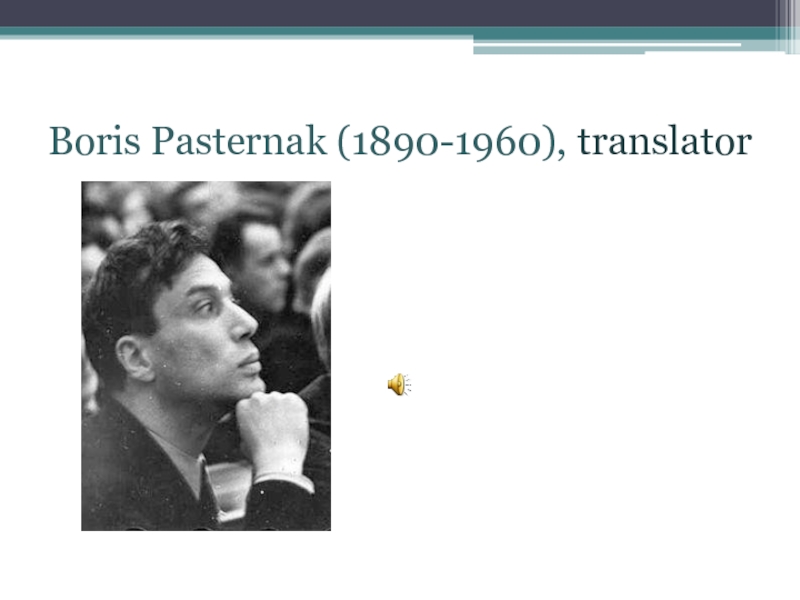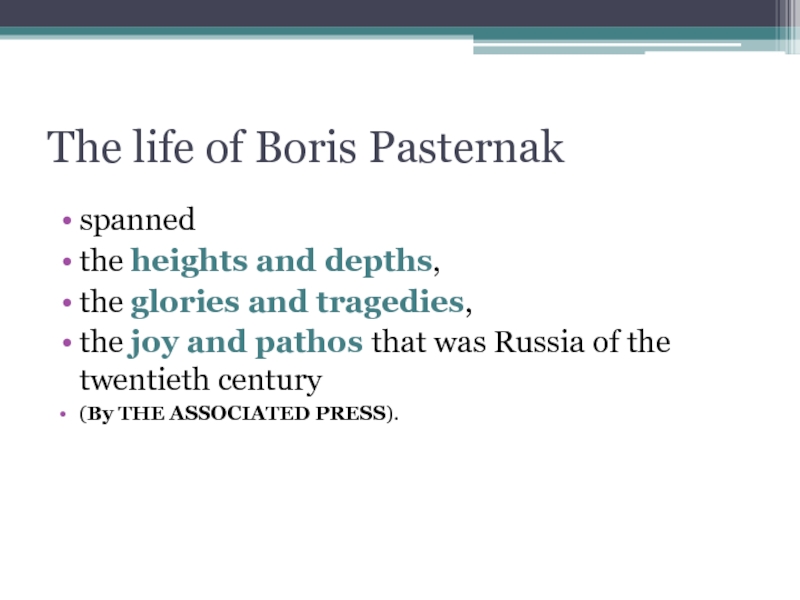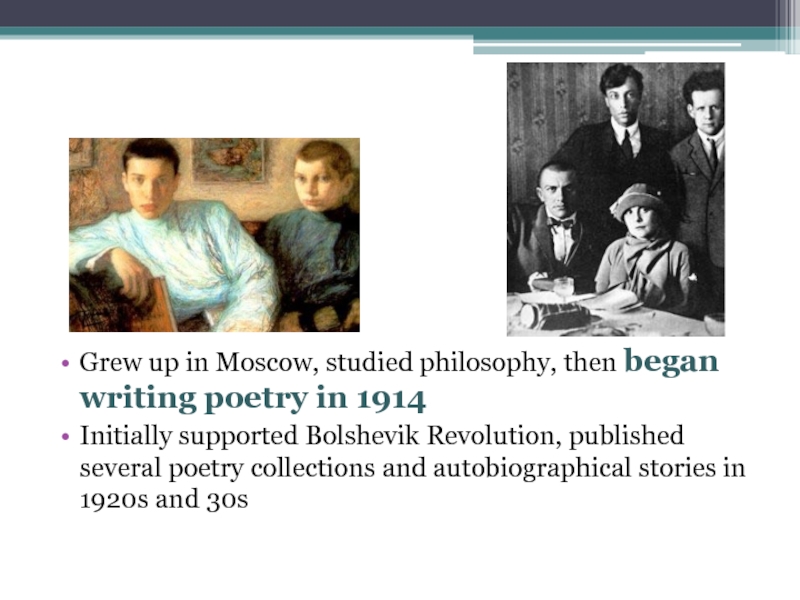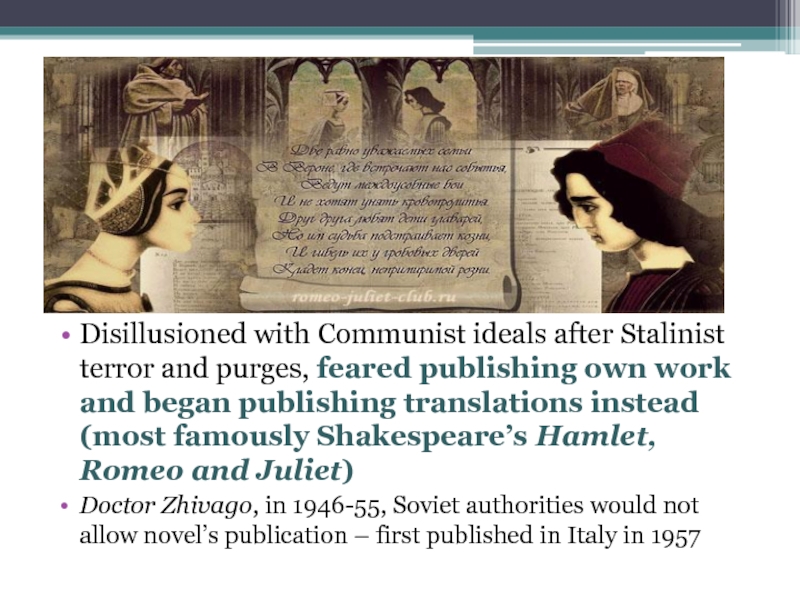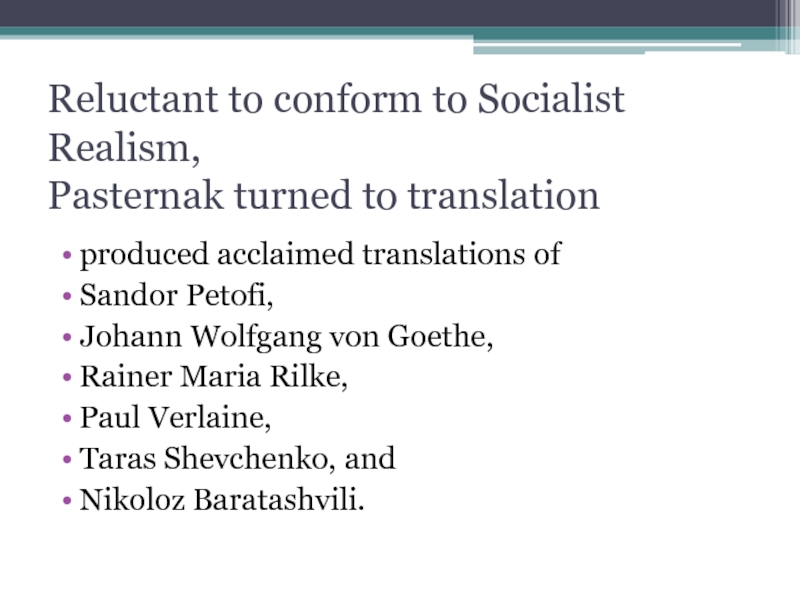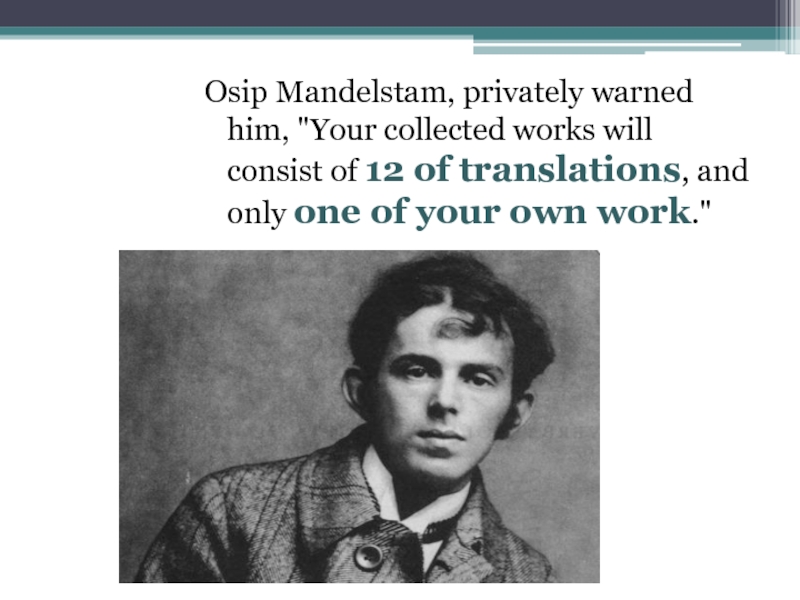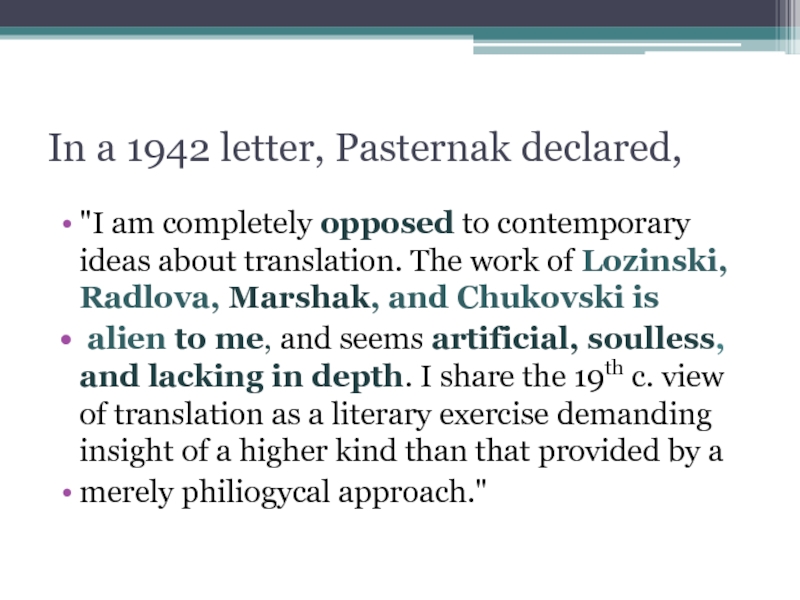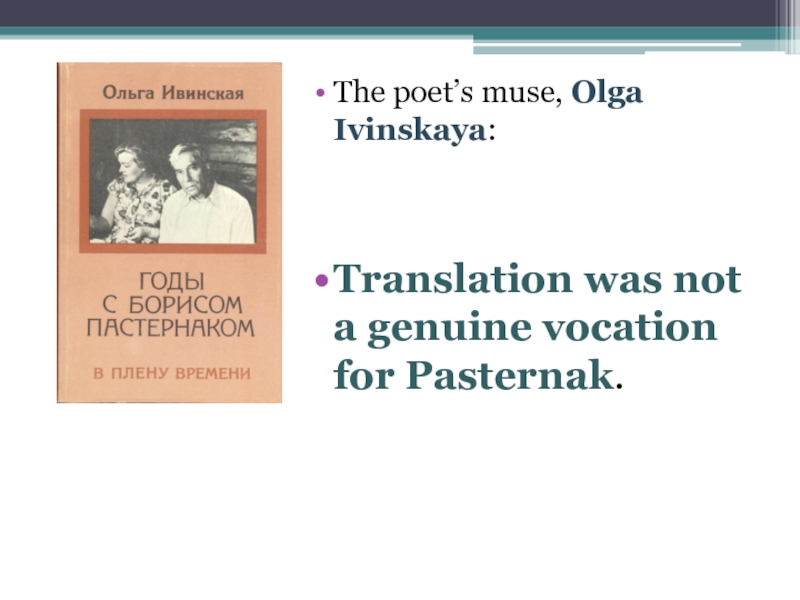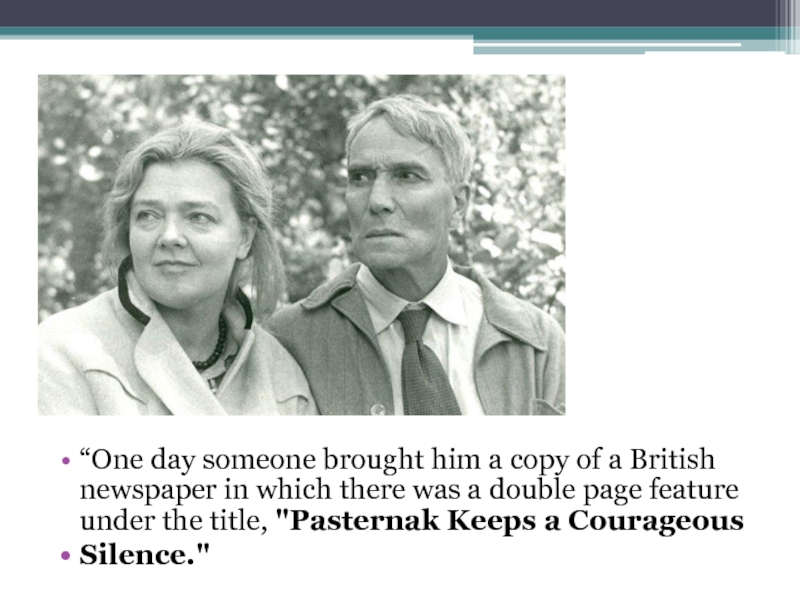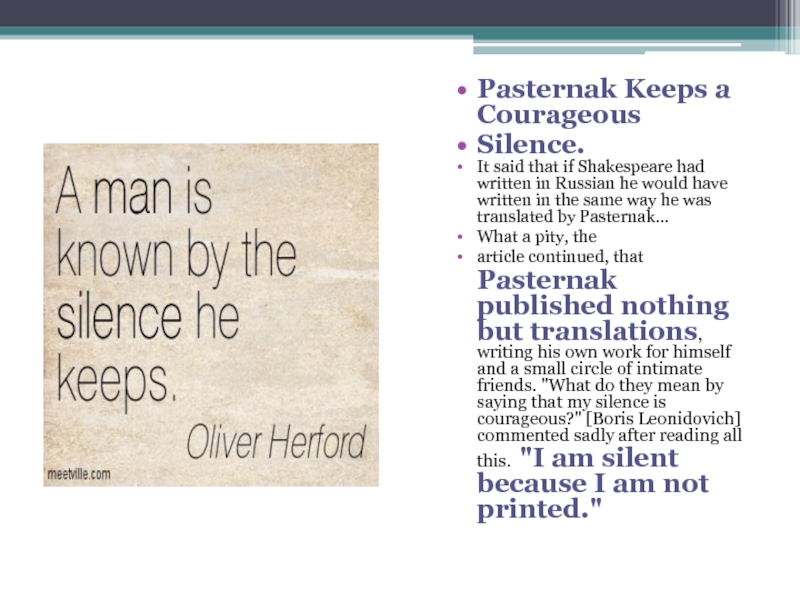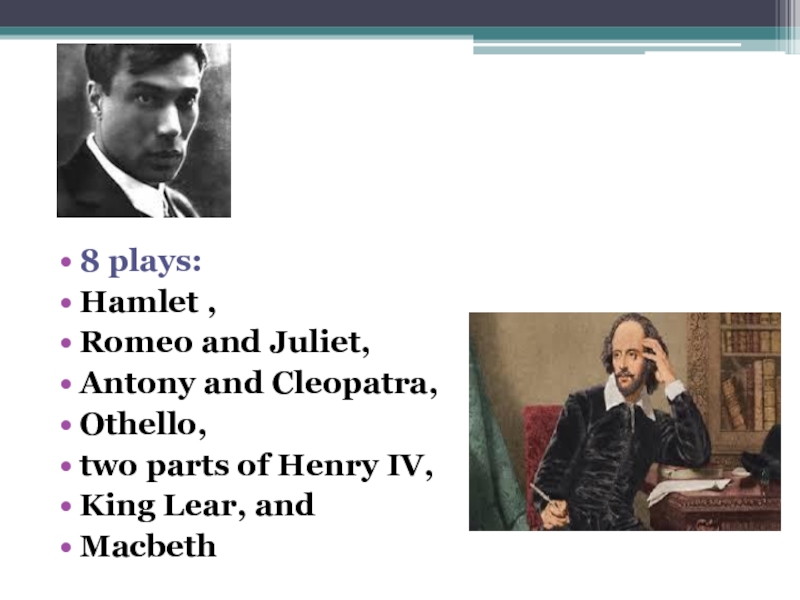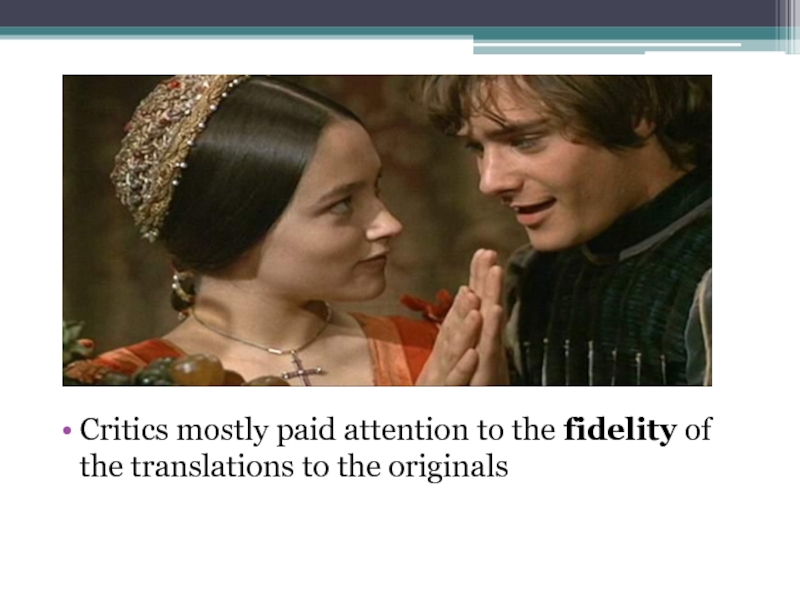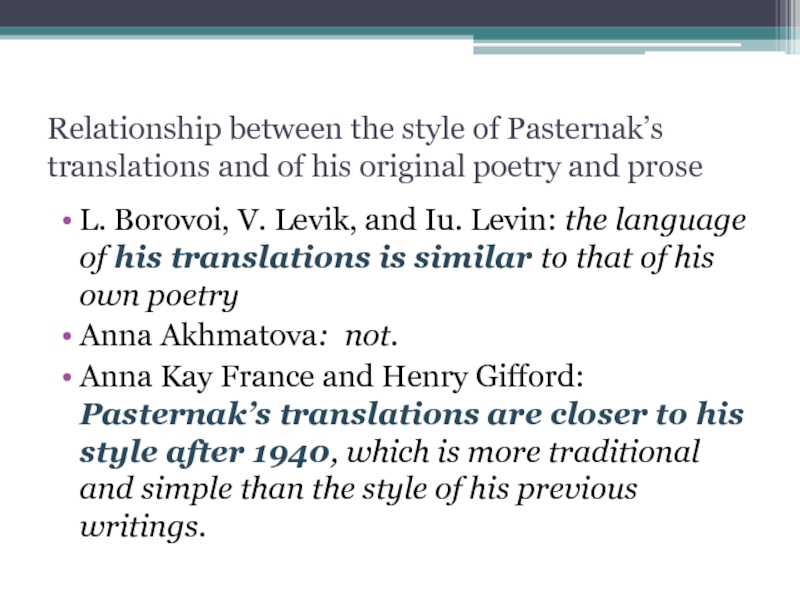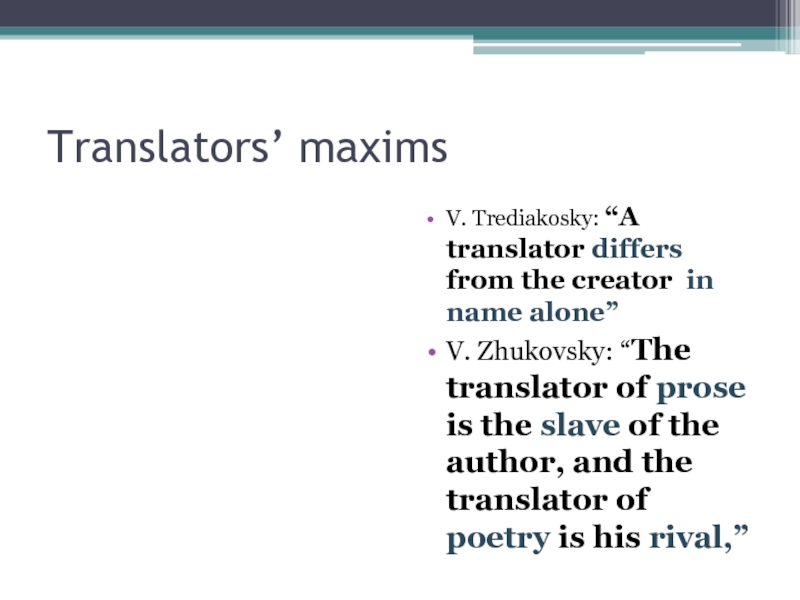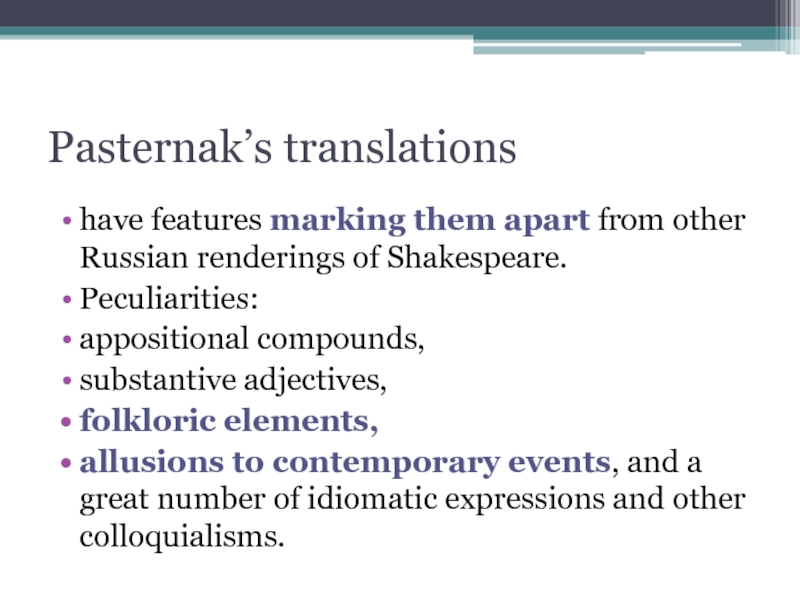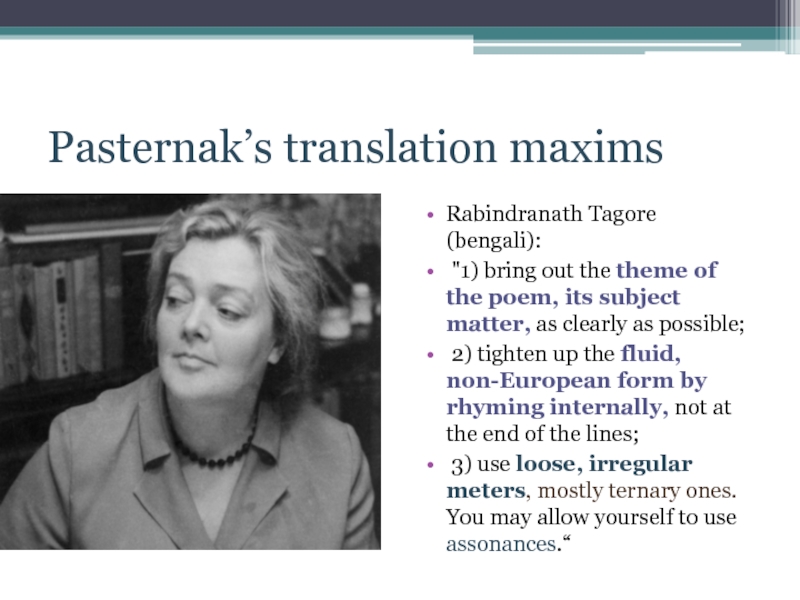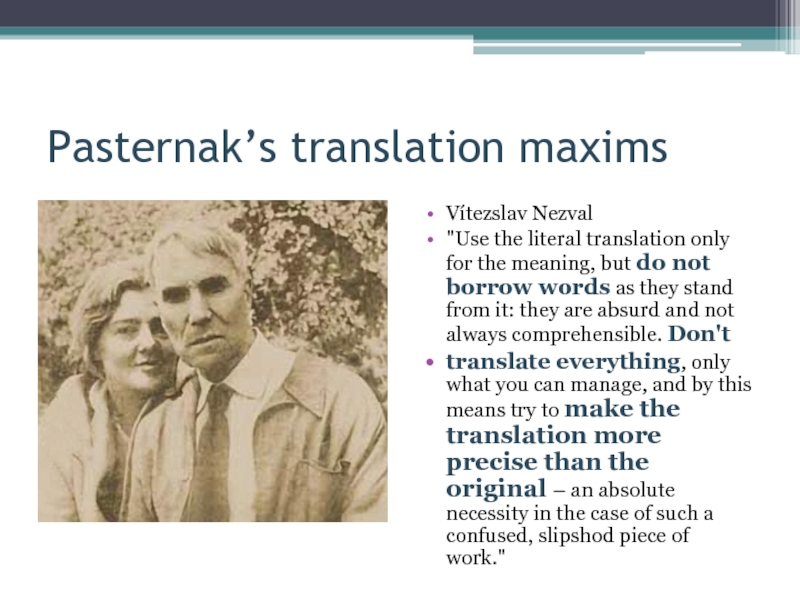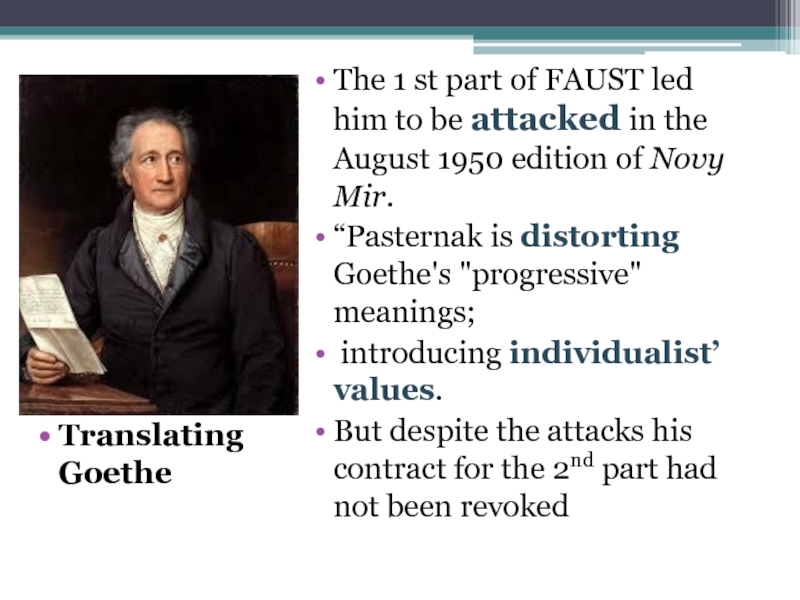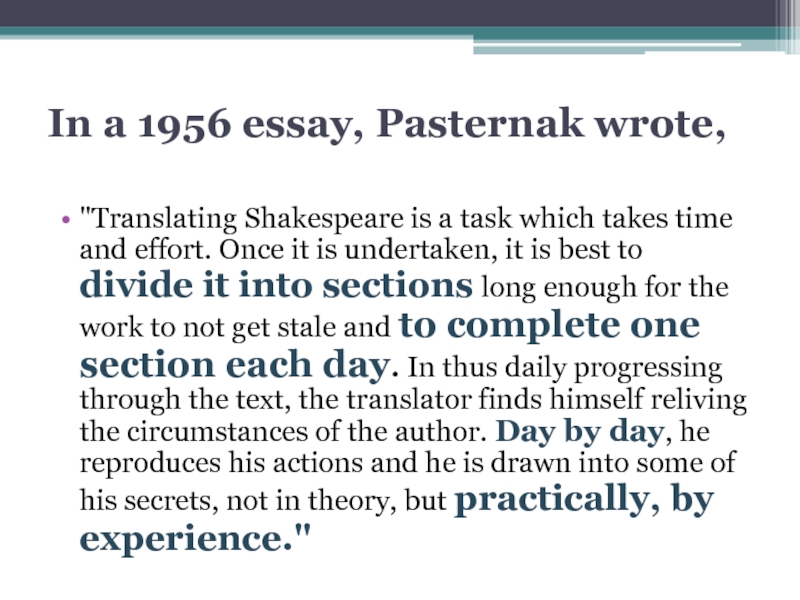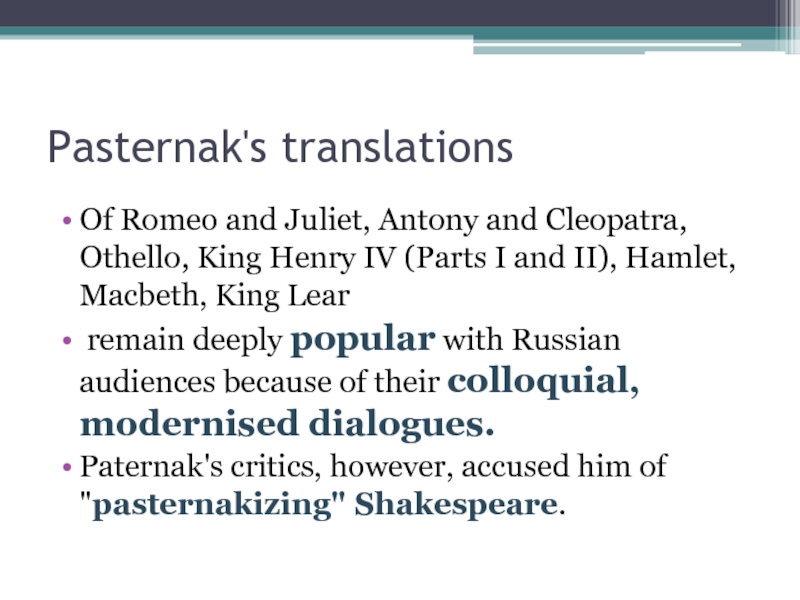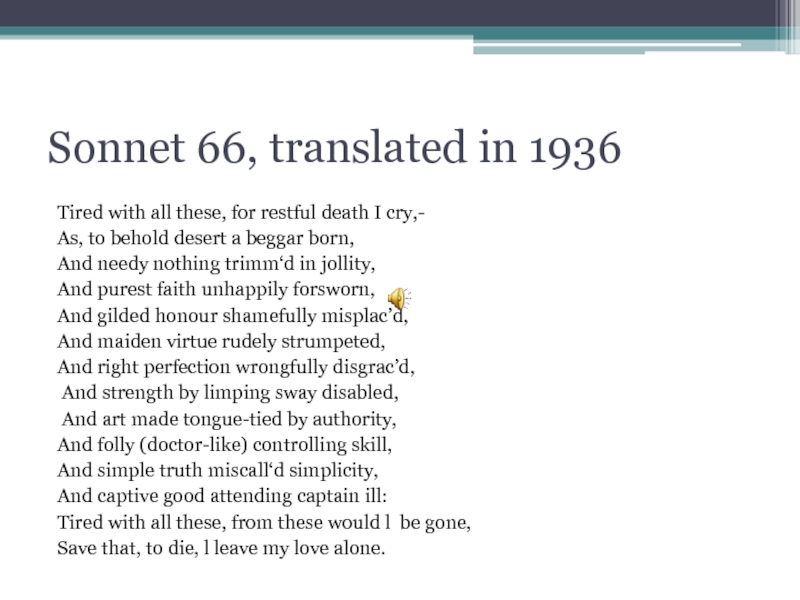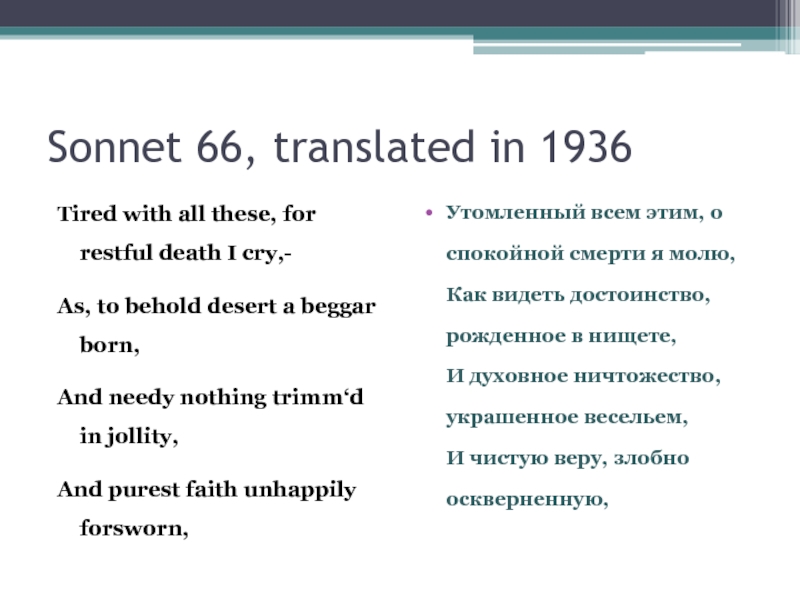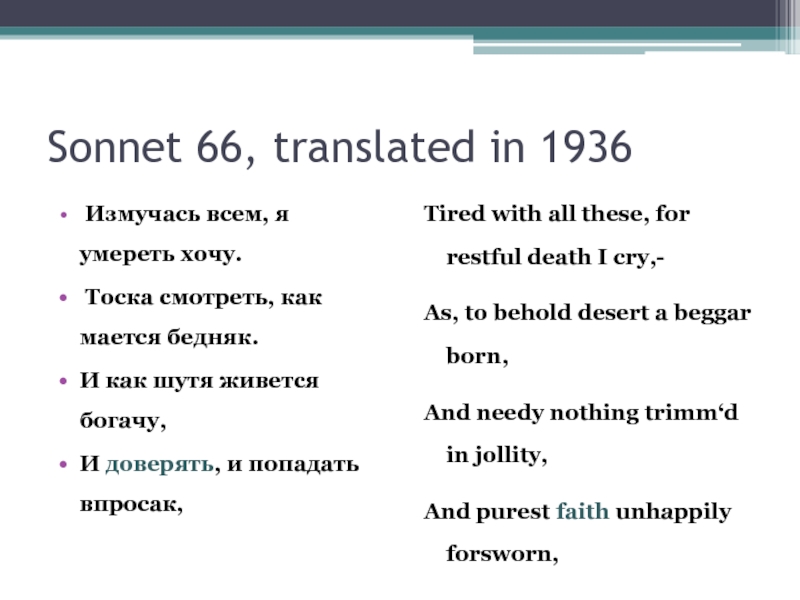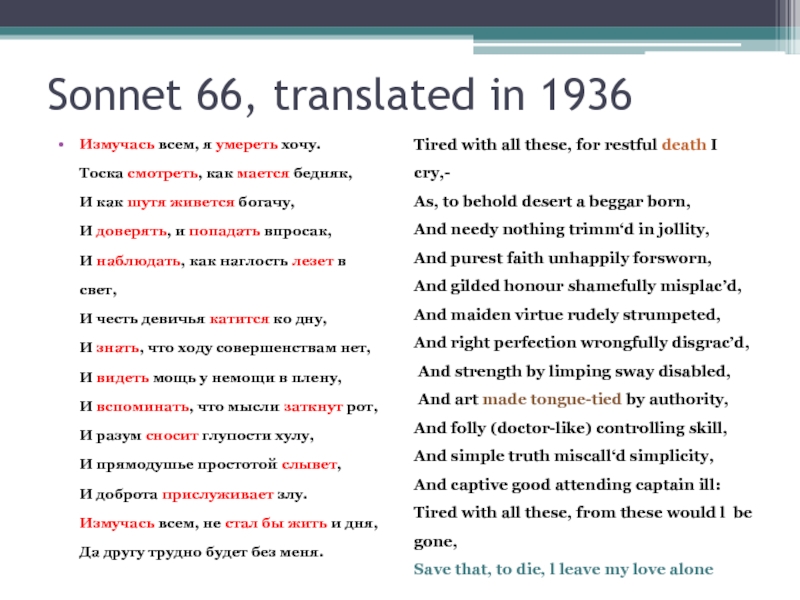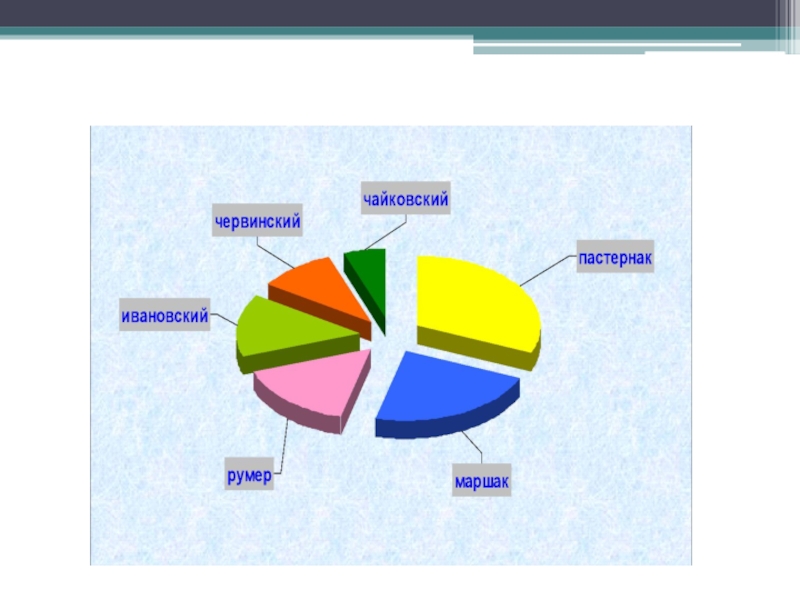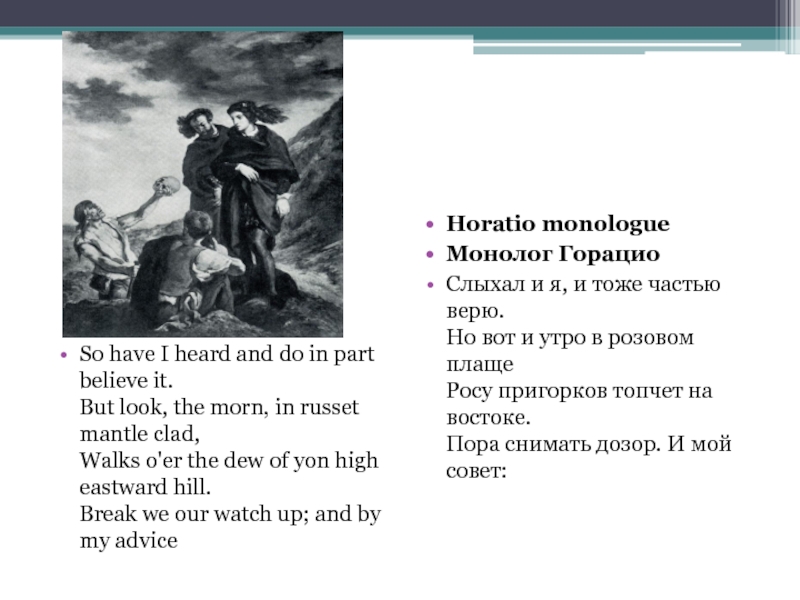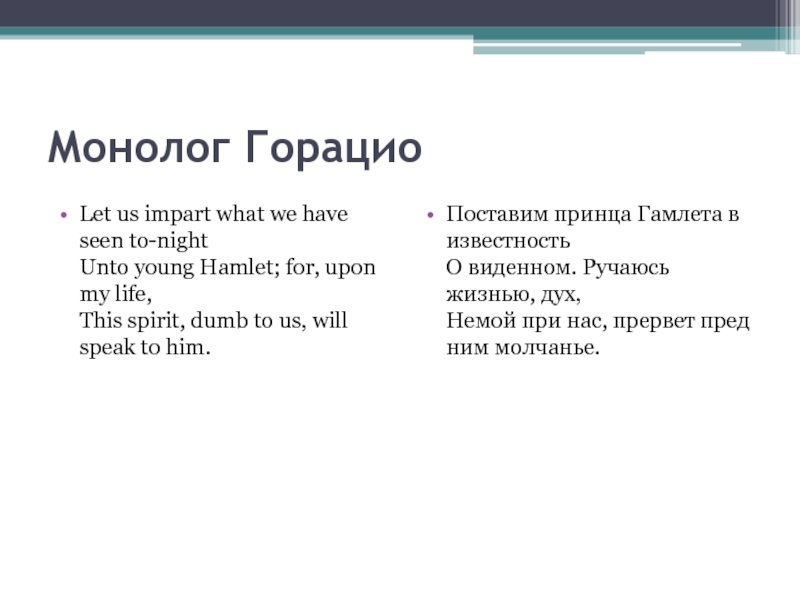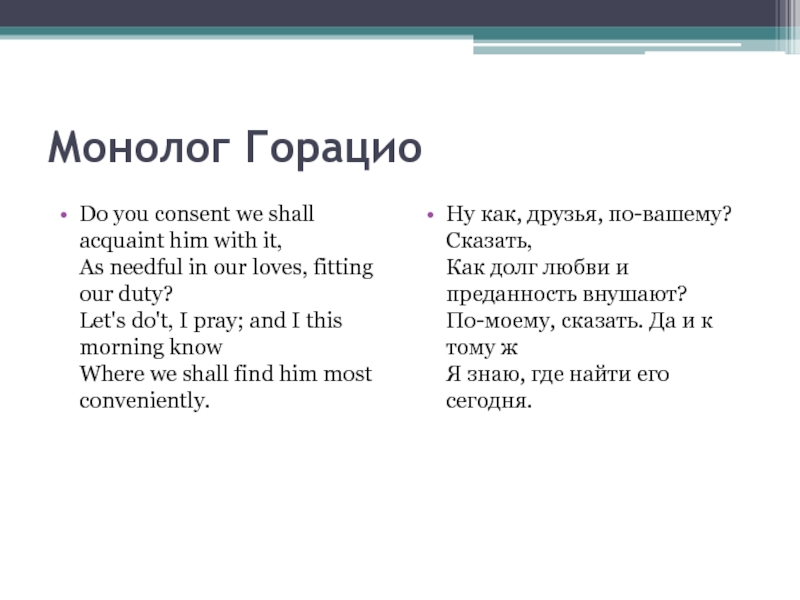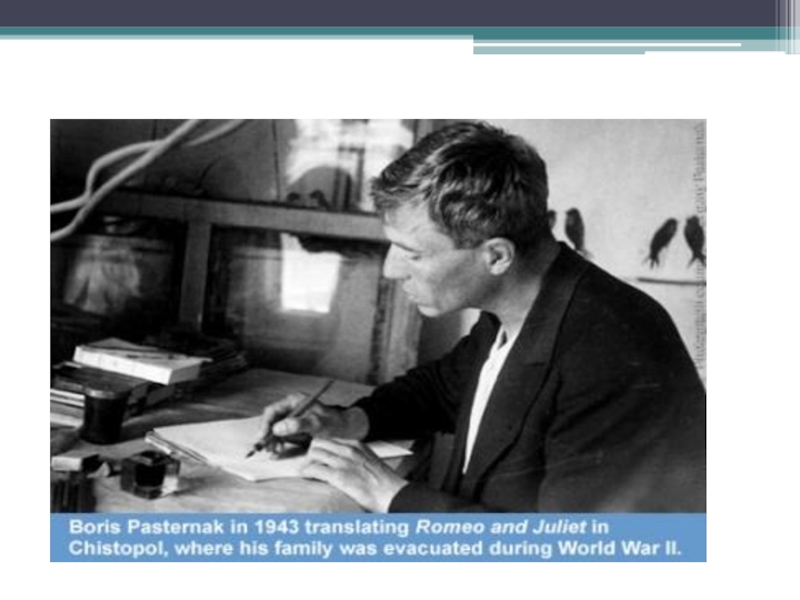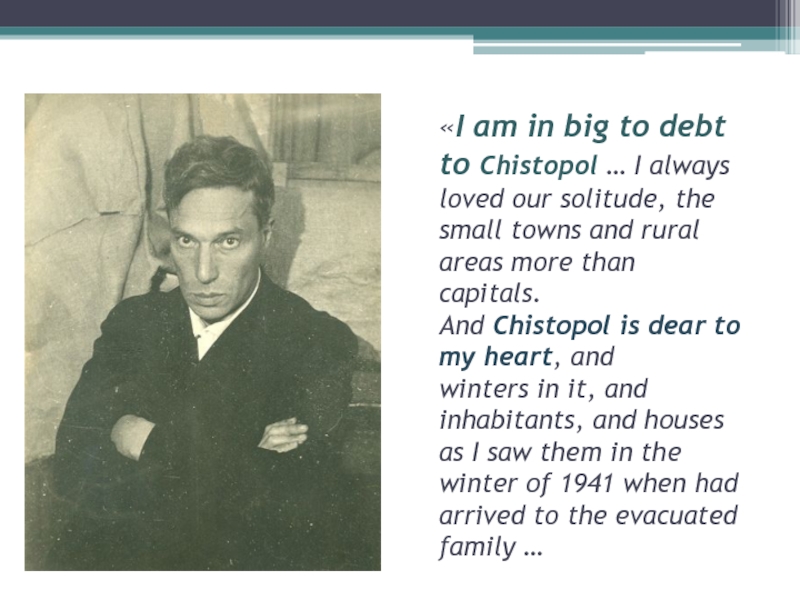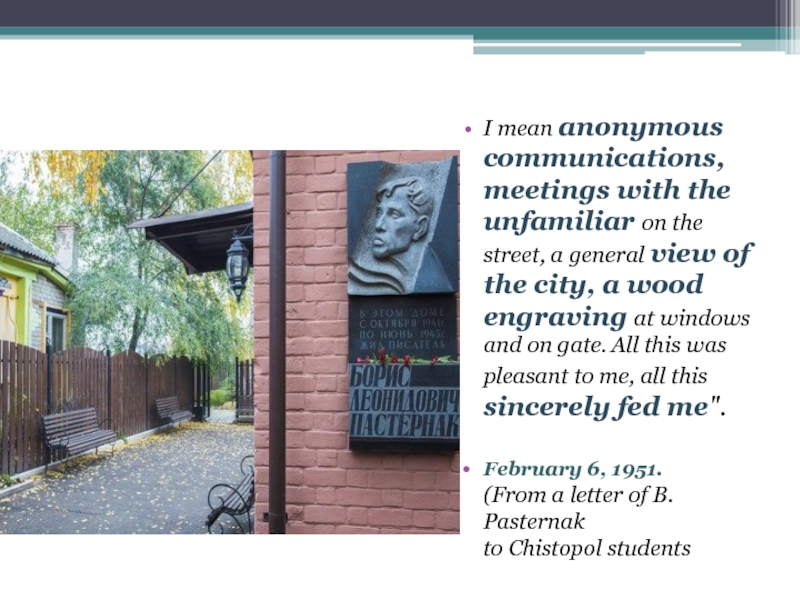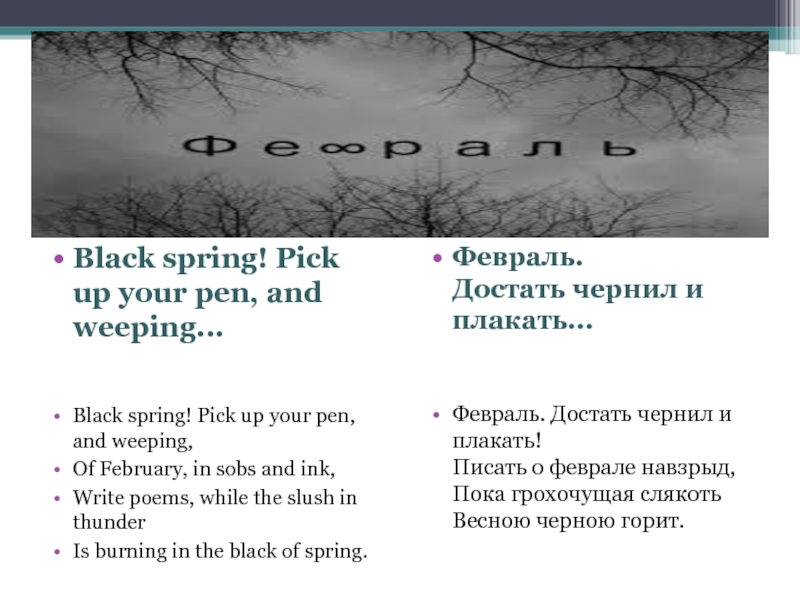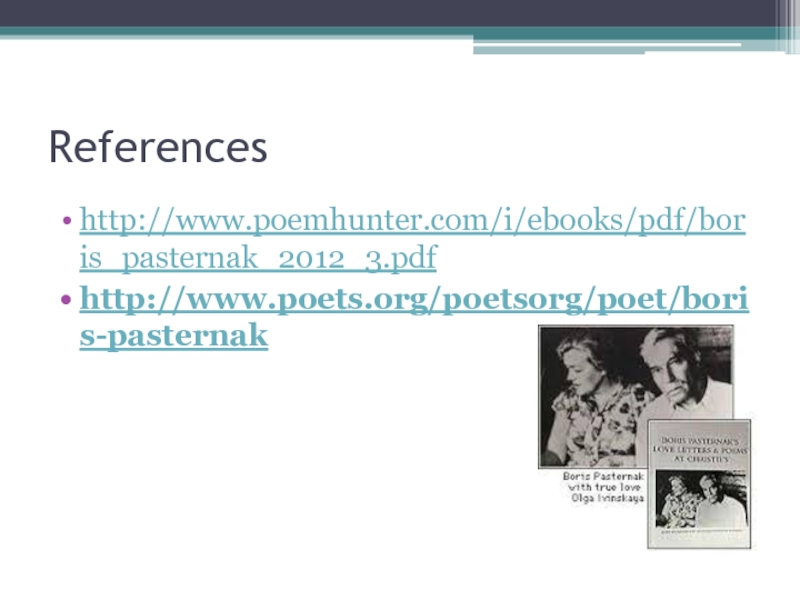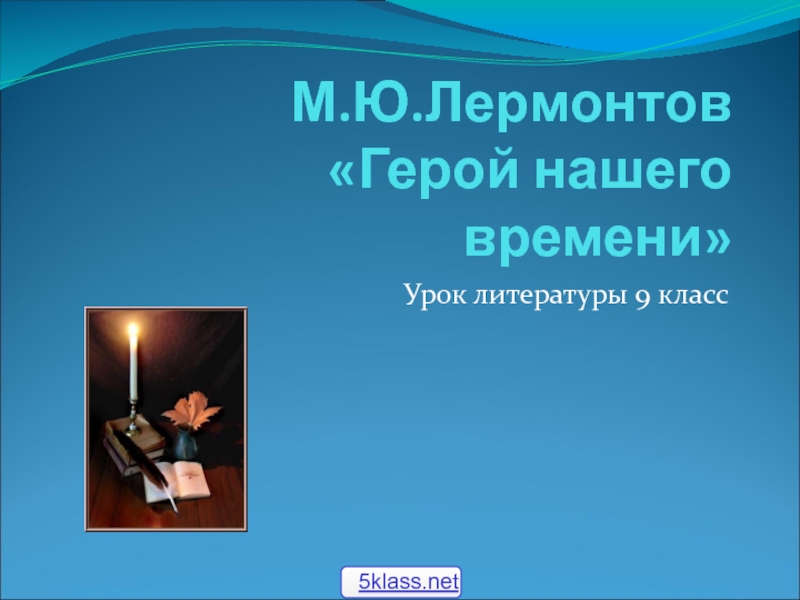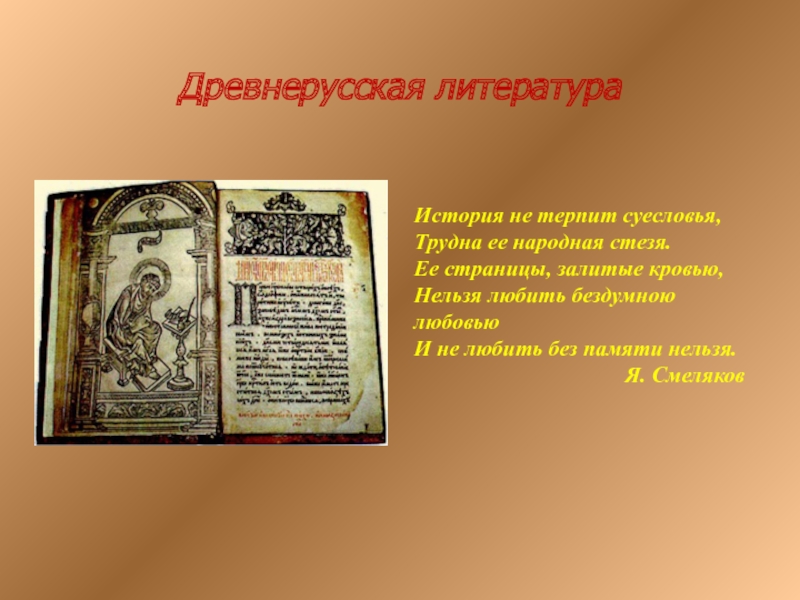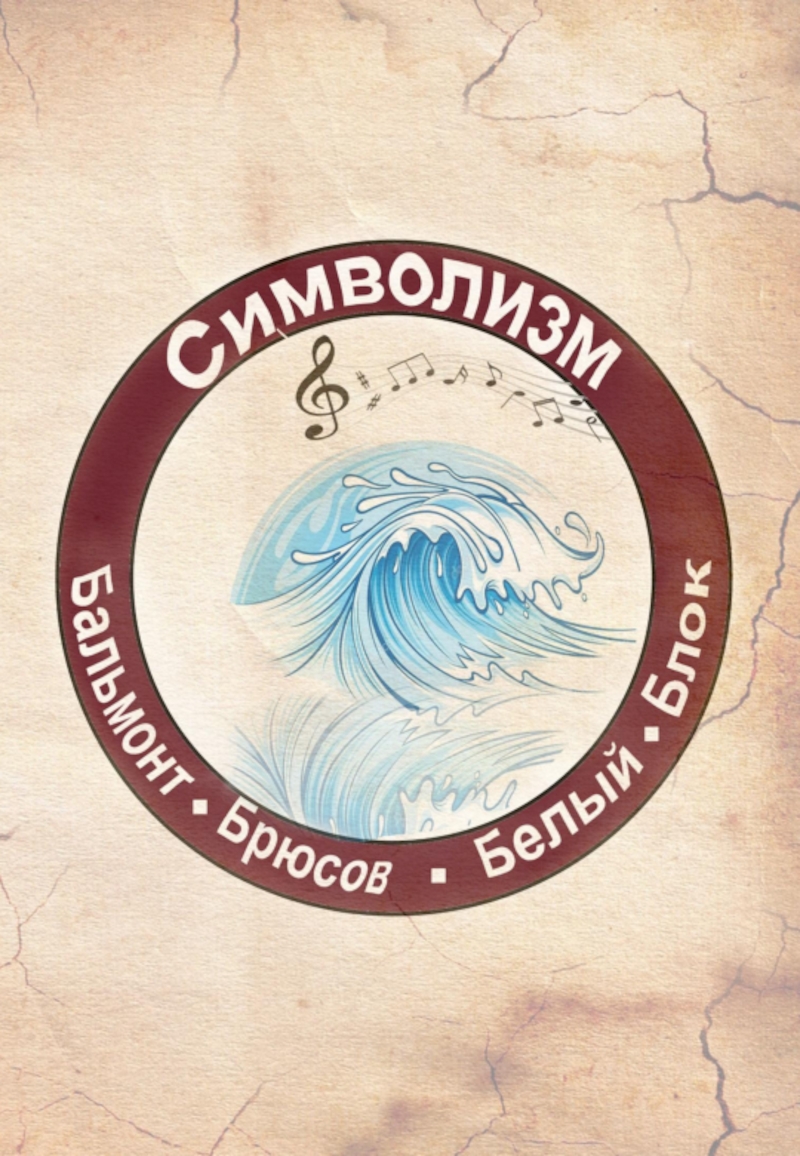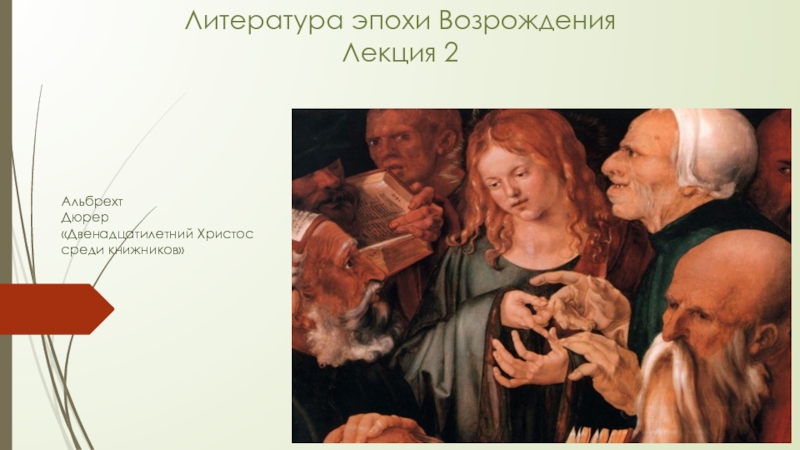- Главная
- Разное
- Дизайн
- Бизнес и предпринимательство
- Аналитика
- Образование
- Развлечения
- Красота и здоровье
- Финансы
- Государство
- Путешествия
- Спорт
- Недвижимость
- Армия
- Графика
- Культурология
- Еда и кулинария
- Лингвистика
- Английский язык
- Астрономия
- Алгебра
- Биология
- География
- Детские презентации
- Информатика
- История
- Литература
- Маркетинг
- Математика
- Медицина
- Менеджмент
- Музыка
- МХК
- Немецкий язык
- ОБЖ
- Обществознание
- Окружающий мир
- Педагогика
- Русский язык
- Технология
- Физика
- Философия
- Химия
- Шаблоны, картинки для презентаций
- Экология
- Экономика
- Юриспруденция
Boris Pasternak (1890-1960), translator презентация
Содержание
- 1. Boris Pasternak (1890-1960), translator
- 2. The life of Boris Pasternak spanned
- 3. Grew up in Moscow, studied philosophy, then
- 4. Disillusioned with Communist ideals after Stalinist terror
- 5. Reluctant to conform to Socialist Realism,
- 6. Osip Mandelstam, privately warned him, "Your collected
- 7. In a 1942 letter, Pasternak declared,
- 8. The poet’s muse, Olga Ivinskaya:
- 9. “One day someone brought him a copy
- 10. Pasternak Keeps a Courageous Silence. It said
- 11. 8 plays: Hamlet ,
- 12. Critics mostly paid attention to the fidelity of the translations to the originals
- 13. Relationship between the style of Pasternak’s translations
- 14. Translators’ maxims V. Trediakosky: “A translator
- 15. Pasternak’s translations have features marking them
- 16. Pasternak’s translation maxims Rabindranath Tagore (bengali):
- 17. Pasternak’s translation maxims Vítezslav Nezval "Use
- 18. The 1 st part of FAUST led
- 19. In a 1956 essay, Pasternak wrote,
- 20. Pasternak's translations Of Romeo and Juliet,
- 21. Sonnet 66, translated in 1936 Tired with
- 22. Sonnet 66, translated in 1936 Tired with
- 23. Sonnet 66, translated in 1936 Измучась
- 24. Sonnet 66, translated in 1936 Измучась всем,
- 26. So have I heard and do
- 27. Монолог Горацио Let us impart what we
- 28. Монолог Горацио Do you consent we shall
- 29. Romeo and Juliet
- 30. «I am in big to debt to
- 31. I mean anonymous communications, meetings with
- 32. Black spring! Pick up your
- 33. References http://www.poemhunter.com/i/ebooks/pdf/boris_pasternak_2012_3.pdf http://www.poets.org/poetsorg/poet/boris-pasternak
Слайд 2The life of Boris Pasternak
spanned
the heights and depths,
the
the joy and pathos that was Russia of the twentieth century
(By THE ASSOCIATED PRESS).
Слайд 3Grew up in Moscow, studied philosophy, then began writing poetry in
Initially supported Bolshevik Revolution, published several poetry collections and autobiographical stories in 1920s and 30s
Слайд 4Disillusioned with Communist ideals after Stalinist terror and purges, feared publishing
Doctor Zhivago, in 1946-55, Soviet authorities would not allow novel’s publication – first published in Italy in 1957
Слайд 5Reluctant to conform to Socialist Realism,
Pasternak turned to translation
produced acclaimed
Sandor Petofi,
Johann Wolfgang von Goethe,
Rainer Maria Rilke,
Paul Verlaine,
Taras Shevchenko, and
Nikoloz Baratashvili.
Слайд 6Osip Mandelstam, privately warned him, "Your collected works will consist of
Слайд 7In a 1942 letter, Pasternak declared,
"I am completely opposed to
alien to me, and seems artificial, soulless, and lacking in depth. I share the 19th c. view of translation as a literary exercise demanding insight of a higher kind than that provided by a
merely philiogycal approach."
Слайд 9“One day someone brought him a copy of a British newspaper
Silence."
Слайд 10Pasternak Keeps a Courageous
Silence.
It said that if Shakespeare had written in
What a pity, the
article continued, that Pasternak published nothing but translations, writing his own work for himself and a small circle of intimate friends. "What do they mean by saying that my silence is courageous?" [Boris Leonidovich] commented sadly after reading all this. "I am silent because I am not printed."
Слайд 11
8 plays:
Hamlet ,
Romeo and Juliet,
Antony and Cleopatra,
Othello,
two parts of Henry IV,
King Lear, and
Macbeth
Слайд 13Relationship between the style of Pasternak’s translations and of his original
L. Borovoi, V. Levik, and Iu. Levin: the language of his translations is similar to that of his own poetry
Anna Akhmatova: not.
Anna Kay France and Henry Gifford: Pasternak’s translations are closer to his style after 1940, which is more traditional and simple than the style of his previous writings.
Слайд 14Translators’ maxims
V. Trediakosky: “A translator differs from the creator in name
V. Zhukovsky: “The translator of prose is the slave of the author, and the translator of poetry is his rival,”
Слайд 15Pasternak’s translations
have features marking them apart from other Russian renderings
Peculiarities:
appositional compounds,
substantive adjectives,
folkloric elements,
allusions to contemporary events, and a great number of idiomatic expressions and other colloquialisms.
Слайд 16Pasternak’s translation maxims
Rabindranath Tagore (bengali):
"1) bring out the theme
2) tighten up the fluid, non-European form by rhyming internally, not at the end of the lines;
3) use loose, irregular meters, mostly ternary ones. You may allow yourself to use assonances.“
Слайд 17Pasternak’s translation maxims
Vítezslav Nezval
"Use the literal translation only for the
translate everything, only what you can manage, and by this means try to make the translation more precise than the original – an absolute necessity in the case of such a confused, slipshod piece of work."
Слайд 18The 1 st part of FAUST led him to be attacked
“Pasternak is distorting Goethe's "progressive" meanings;
introducing individualist’ values.
But despite the attacks his contract for the 2nd part had not been revoked
Translating Goethe
Слайд 19In a 1956 essay, Pasternak wrote,
"Translating Shakespeare is a task which
Слайд 20Pasternak's translations
Of Romeo and Juliet, Antony and Cleopatra, Othello, King
remain deeply popular with Russian audiences because of their colloquial, modernised dialogues.
Paternak's critics, however, accused him of "pasternakizing" Shakespeare.
Слайд 21Sonnet 66, translated in 1936
Tired with all these, for restful death
As, to behold desert a beggar born,
And needy nothing trimm‘d in jollity,
And purest faith unhappily forsworn,
And gilded honour shamefully misplac’d,
And maiden virtue rudely strumpeted,
And right perfection wrongfully disgrac’d,
And strength by limping sway disabled,
And art made tongue-tied by authority,
And folly (doctor-like) controlling skill,
And simple truth miscall‘d simplicity,
And captive good attending captain ill:
Tired with all these, from these would l be gone,
Save that, to die, l leave my love alone.
Слайд 22Sonnet 66, translated in 1936
Tired with all these, for restful death
As, to behold desert a beggar born,
And needy nothing trimm‘d in jollity,
And purest faith unhappily forsworn,
Утомленный всем этим, о спокойной смерти я молю, Как видеть достоинство, рожденное в нищете, И духовное ничтожество, украшенное весельем, И чистую веру, злобно оскверненную,
Слайд 23Sonnet 66, translated in 1936
Измучась всем, я умереть хочу.
Тоска смотреть, как мается бедняк.
И как шутя живется богачу,
И доверять, и попадать впросак,
Tired with all these, for restful death I cry,-
As, to behold desert a beggar born,
And needy nothing trimm‘d in jollity,
And purest faith unhappily forsworn,
Слайд 24Sonnet 66, translated in 1936
Измучась всем, я умереть хочу.
Тоска смотреть, как
Tired with all these, for restful death I cry,-
As, to behold desert a beggar born,
And needy nothing trimm‘d in jollity,
And purest faith unhappily forsworn,
And gilded honour shamefully misplac’d,
And maiden virtue rudely strumpeted,
And right perfection wrongfully disgrac’d,
And strength by limping sway disabled,
And art made tongue-tied by authority,
And folly (doctor-like) controlling skill,
And simple truth miscall‘d simplicity,
And captive good attending captain ill:
Tired with all these, from these would l be gone,
Save that, to die, l leave my love alone
Слайд 26
So have I heard and do in part believe it.
But look,
Horatio monologue
Монолог Горацио
Слыхал и я, и тоже частью верю.
Но вот и утро в розовом плаще
Росу пригорков топчет на востоке.
Пора снимать дозор. И мой совет:
Слайд 27Монолог Горацио
Let us impart what we have seen to-night
Unto young Hamlet;
Поставим принца Гамлета в известность
О виденном. Ручаюсь жизнью, дух,
Немой при нас, прервет пред ним молчанье.
Слайд 28Монолог Горацио
Do you consent we shall acquaint him with it,
As needful
Ну как, друзья, по-вашему? Сказать,
Как долг любви и преданность внушают?
По-моему, сказать. Да и к тому ж
Я знаю, где найти его сегодня.
Слайд 30«I am in big to debt to Chistopol … I always
Слайд 31
I mean anonymous
communications, meetings with the unfamiliar on the
street, a general
February 6, 1951. (From a letter of B. Pasternak to Chistopol students
Слайд 32
Black spring! Pick up your pen, and weeping...
Black spring! Pick up
Of February, in sobs and ink,
Write poems, while the slush in thunder
Is burning in the black of spring.
Февраль.
Достать чернил и плакать...
Февраль. Достать чернил и плакать!
Писать о феврале навзрыд,
Пока грохочущая слякоть
Весною черною горит.
